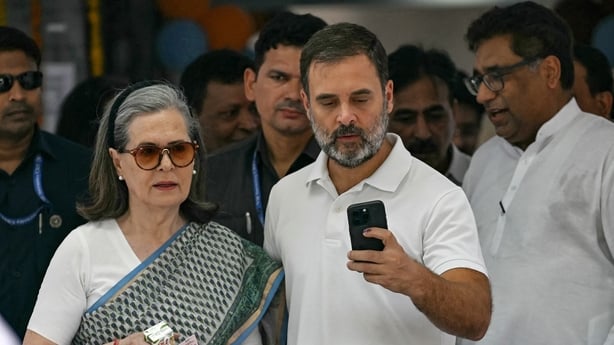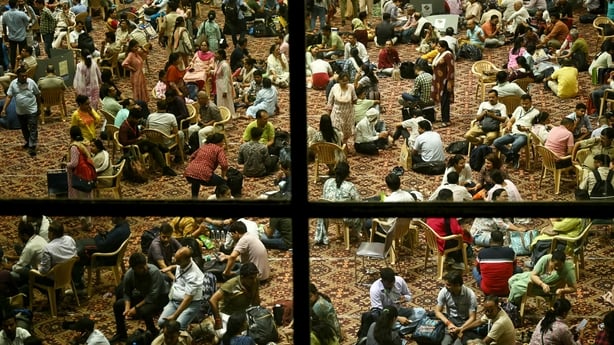Indian voters braved temperatures of nearly 45 degrees Celsius in parts of the country as they headed to polling stations in the penultimate phase of the world's largest election.
More than 111 million people in 58 constituencies across eight states and federal territories are eligible to vote in the general election's sixth phase, which recorded turnout of 49.2% at 3pm, with three hours of polling left.
The overall turnout in the same phase of the last election in 2019 was about 63%.
Among those casting their ballots early this morning in the capital, New Delhi, were Rahul Gandhi, leader of the opposition Congress party and the main rival of Prime Minister Narendra Modi - whose Hindu-nationalist Bharatiya Janata Party is expected to win a third consecutive term.
Mr Gandhi was accompanied by his mother, Sonia Gandhi, and sister, Priyanka Vadra.
Voting in the elections began on 19 April and will conclude on 1 June, with results due on 4 June.
Paramedics were on hand with oral hydration salts at polling stations in Delhi, where mist machines, shaded waiting areas and cold water dispensers have also been installed by the Election Commission due to concerns about the heat.

"We hope that people will overcome the fear of the heatwave and come and vote," Delhi Chief Electoral Officer P Krishnamurthy said.
Mr Modi also urged people to "vote in large numbers" in a message on social media platform X.
It was not clear which party would gain from a lower turnout.
The temperature in the capital hovered around 42C, but felt like 49C at 2pm, the weather department said, prompting many voters to question why polls were not held when the weather was "more conducive".
At 3pm, turnout in the city stood at 44.5%.
At a school in the Trilokpuri area that was being used for polling, sheets and tarpaulin were strung up in the courtyard to provide shade to voters queuing up despite the heat.
"If we sit at home saying it is hot outside, who will vote?" said housewife Bhuwneshwari Pillai, 32, fanning herself with a sheet of paper and mopping her brow with a towel.
In some parts of the northern state of Haryana, people living near polling booths also pitched in to help voters beat the heat, handing out free cold drinks and dried fruits.

Voters' Concerns
Price rises and a lack of jobs were two of the major issues mentioned by voters when asked about the factors that determined their vote.
"Our youth are unemployed, the prices of essential commodities have sky-rocketed. We have come to vote for the candidate who resolves these issues," said Ghulam Qadir Chouhan, 75, in the northern state of Jammu and Kashmir's Anantnag region.
In Delhi, Nishu Singh, 43, who travelled from a neighbouring town to vote, said her ballot was "for the country's development".
For social scientist Savitha Jha, who was voting in Haryana's business hub Gurugram, which shares a border with Delhi and saw Hindu-Muslim clashes last year, the election was a chance to ensure security for all.
"I'm voting for internal security and for external security of the nation and everyone in it, not just any one community," she said.
While the heatwave was a concern in Delhi, a cyclone that is expected to hit land tomorrow was being closely watched in eastern Odisha and West Bengal, parts of which are also voting today.

